A slogan lost in translation
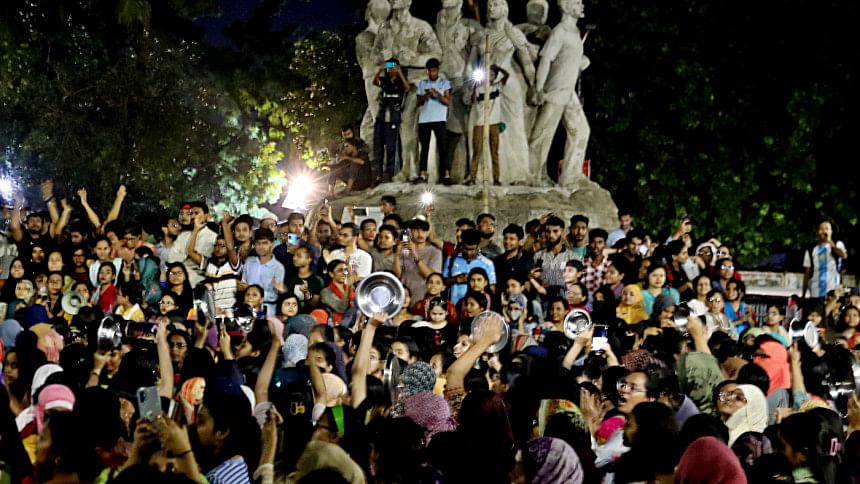
The course of the ongoing quota reform protests has taken a drastic turn over the last two days. On Tuesday, at least six individuals, mostly students, died during clashes between protesters and members of Bangladesh Chhatra League and the police—marking a further escalation from the previous day's events. Few would have imagined this scenario when students gathered in Dhaka University and other campuses on Sunday night.
For over two weeks prior to this, they had been boycotting classes and exams, and blockading key intersections in Dhaka and major highways in different places of the country with the demand to reform the quota system in civil service recruitment. But what made them flood campus streets on that night was a specific comment that touched a nerve for the wider student community. On Sunday, in response to a journalist's question during a press conference, Prime Minister Sheikh Hasina said, "Why do they [anti-quota protesters] have so much resentment towards the freedom fighters? If the grandchildren of the freedom fighters don't get quota benefits, should the grandchildren of Razakars get the benefit?"
This questionable dichotomy is what lit the fuse, leading to students exploding in protest with renewed vigour. And among all the slogans heard across the DU campus that night, the one that seems to have had the most intense impact is the one that goes: "Tui ke? Ami ke? Razakar, Razakar!" (Who are you? Who am I? Razakar, Razakar!) There have been other, more explanatory variations of the slogan, but for whatever reason, those didn't get much coverage. The question is, what made these students—otherwise proud citizens of an independent Bangladesh, and carrying the legacy of our independence struggle—utter such incendiary slogans?
Grievances over the preferential quota system are nothing new; in fact, the way the protests have panned out this time are starkly reminiscent of what happened during the 2018 quota reform movement. Protests began at Shahbagh then as they did now, before spreading across the country. In 2018, like this time around, a senior member of the ruling party remarked in parliament, "Will the children and successors of those who risked their lives to fight for independence not get an opportunity? Will the children of Razakars get the chance? Will the quota for the freedom fighters be shrunk for them?"
Six years ago, students protested this particular line of reasoning—as they did on Sunday night. And the reaction to it on both occasions was nothing short of extraordinary. That said, it is totally unfortunate that in a movement that concerns the wellbeing of general students in modern-day Bangladesh, the word "Razakar" has occupied so much of the conversation. On principle, we must say we are against any identification—however unintended—with this term. Students, having been familiarised with the history of our nation from a young age, should have known better than to use something that only invokes the hateful memories of the atrocities committed by Razakars in 1971.
But students say the slogan was lost in translation. Their use of the term, they say, was sarcastic and heavy with context. Take away that context, and you have a totally different connotation. And this is what is happening at the moment. Unfortunately, despite the clarification from students, there has been little hint of reciprocation from those protesting the use of the word Razakar. Clearly, a mismatch exists between the protesting students and the powers that be. But what was stopping Bangladesh Chhatra League, a student party made up of students, from trying to understand the feelings of pain and anguish that led to such utterances? Why, instead of trying to impress upon them the inappropriateness of their slogan or supporting their just cause for quota reforms, did Chhatra League unleash violence on them?
After Sunday night, we have seen the ministers of road transport and bridges, education, and social welfare, and state ministers for ICT and information all come out with hardened words against the protesters. None of them seemed to have noticed that the protesters themselves offered further explanation of their mood by chanting, "Chaite gelam odhikar, hoye gelam Razakar." (Demanded rights, only to become Razakar.) Instead of trying to engage with the students and bridge any gap in communication, the Awami League general secretary has instead called on BCL to provide a "fitting reply".
We have seen the destructive nature of that reply over the past two days. Such violence and brutal attacks over a naive use of an objectionable slogan are hard to accept. We must remember that these students would never support anti-liberation ideals. Attempts could have been made to clear any confusion through amicable means. That would have been a much wiser way to deal with these realities instead of the violence that has ensued since.
Azmin Azran is digital features coordinator at The Daily Star.
Views expressed in this article are the author's own.
Follow The Daily Star Opinion on Facebook for the latest opinions, commentaries and analyses by experts and professionals. To contribute your article or letter to The Daily Star Opinion, see our guidelines for submission.

 For all latest news, follow The Daily Star's Google News channel.
For all latest news, follow The Daily Star's Google News channel. 
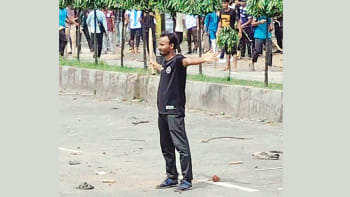
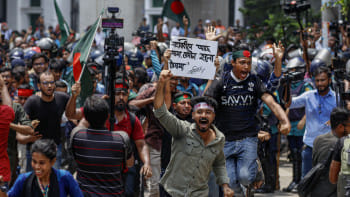


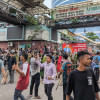

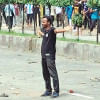



Comments